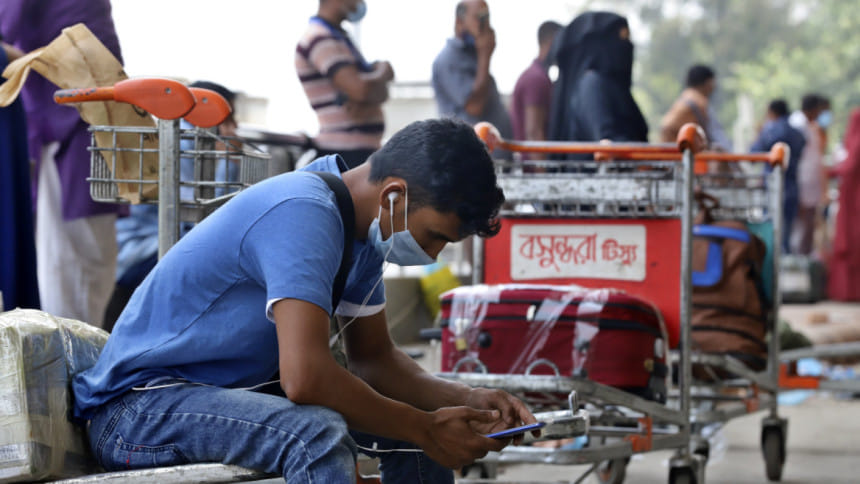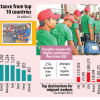Will migrant workers’ dreams remain unfulfilled?

The International Day of Family Remittances (IDFR) is observed on June 16, a commemoration initiated in 2015 with support from the United Nations' International Fund for Agricultural Development (IFAD). This year's global theme is "Remittances Financing Development." The day honours the sacrifices of migrant workers worldwide and their vital contributions to family and national economies through remittances.
The concept of remittances is not new. Migrant labourers sending money home dates back to colonial times. Today's formal systems are a modern continuation of that.
For developing countries like Bangladesh, remittances are a key economic pillar. But a pressing question remains: are the dreams and sacrifices of those behind the remittances truly acknowledged? Or are they simply meeting the needs of others while leaving their own aspirations unfulfilled?
Worldwide, over 280 million people currently live and work abroad for better job opportunities. The money they send home plays a significant role in global development. According to the World Bank, remittances to developing countries totalled around $650 billion in 2024. More than half of this amount—about $322 billion—was sent to just five countries. India led with $129 billion, followed by Mexico ($68 billion), China ($48 billion), the Philippines ($40 billion), and Pakistan ($33 billion).
In smaller economies, remittances form a large share of GDP—45 percent in Tajikistan, 38 percent in Tonga, and over 25 percent in countries like Lebanon, Nicaragua, and Samoa—helping to offset fiscal deficits and economic instability.
Since its independence, Bangladesh has pursued foreign employment, especially in the Middle East. Formal labour migration began in 1976, and remittances have since been a major source of foreign income. By the 1980s and 1990s, labour markets expanded to Southeast Asia and beyond. As overseas employment grew, remittance channels became more secure, aided by policy support and the Ministry of Expatriates' Welfare and Overseas Employment.
Technological advancements in the 2000s, especially mobile banking, made sending money faster and safer. This helped solidify remittances as an economic mainstay.
According to the Bureau of Manpower, Employment and Training (BMET), more than 15 million Bangladeshis have gone abroad on work visas over the last 50 years. Their remittances have boosted the country's foreign currency reserves and revitalised rural areas.
In the first five months of 2025 alone, Bangladeshi expatriates sent home over $13 billion, which made the country the sixth highest remittance recipient globally.
Remittances are Bangladesh's second largest source of foreign currency after exports. But their impact goes far beyond balance sheets: families of remittance senders experience better living standards and reduced poverty, and more spending on schools and medical care boosts human development. Remittance income supports micro-enterprises and job creation. These inflows strengthen national economic resilience. Ultimately, remittances help ensure food security, improve access to services, reduce inequality, and promote women's empowerment.
Each year, hundreds of thousands of Bangladeshis move to the Middle East, Southeast Asia, Europe and beyond, seeking better lives and livelihood opportunities. Their aim is simple: financial stability and a better future for their families. But the path is often painful. Many take loans or sell land to pay brokers, entering a cycle of debt even before departure. After arrival, they often face contract violations, wage delays, poor living conditions, and isolation. The work is gruelling and hours are long, but they endure for their families.
Sending money home isn't always easy. Despite progress, many still rely on informal channels like hundi, risking their hard-earned money and costing the nation valuable foreign currency. Access to secure digital services remains limited in some areas.
These workers dream modestly: a home and education for their children. Yet, many return home empty-handed, without reintegration support, job prospects or recognition.
To ensure migrants' dreams are realised, we need effective policies and a humane state response. Key steps include: ensuring safe, accessible remittance channels; providing training, legal aid, and information before departure to reduce exploitation; protecting migrant families; supporting reintegration by offering returnees skill training, microcredit, and employment pathways; strengthening diplomatic support by making embassies more responsive and compassionate towards migrant needs; and expanding incentives.
Remittances aren't just transactions. They are a child's tuition, a mother's medicine, a family's sustenance. Migrant workers send more than money. They send love, courage, and untold stories of struggle. They deserve more than symbolic recognition. They deserve lasting commitment. Only then will their sacrifices result in fulfilled dreams.
M M Mahbub Hasan is a banker and development researcher. He can be reached at [email protected].
Views expressed in this article are the author's own.
Follow The Daily Star Opinion on Facebook for the latest opinions, commentaries and analyses by experts and professionals. To contribute your article or letter to The Daily Star Opinion, see our guidelines for submission.

 For all latest news, follow The Daily Star's Google News channel.
For all latest news, follow The Daily Star's Google News channel. 










Comments